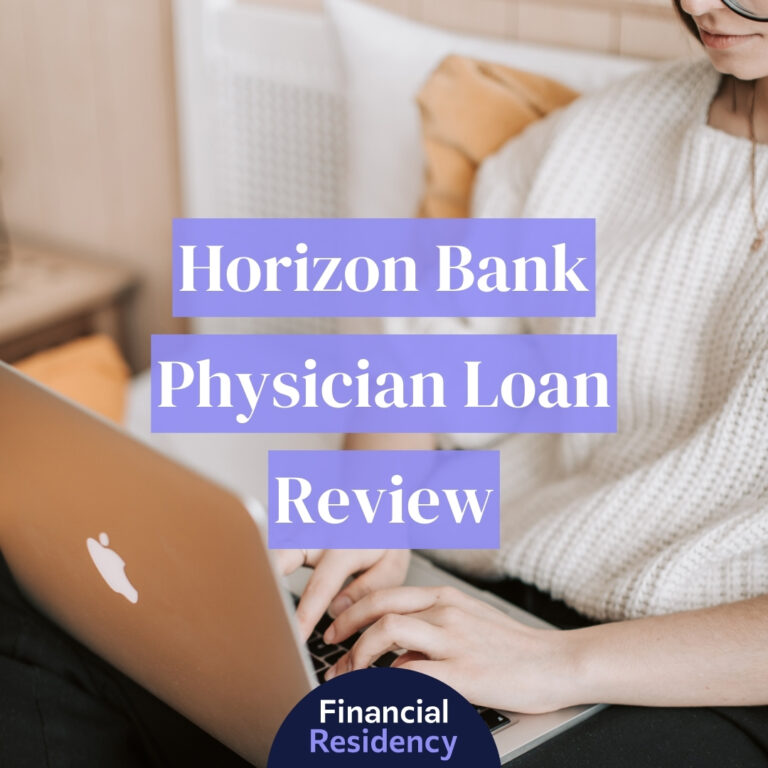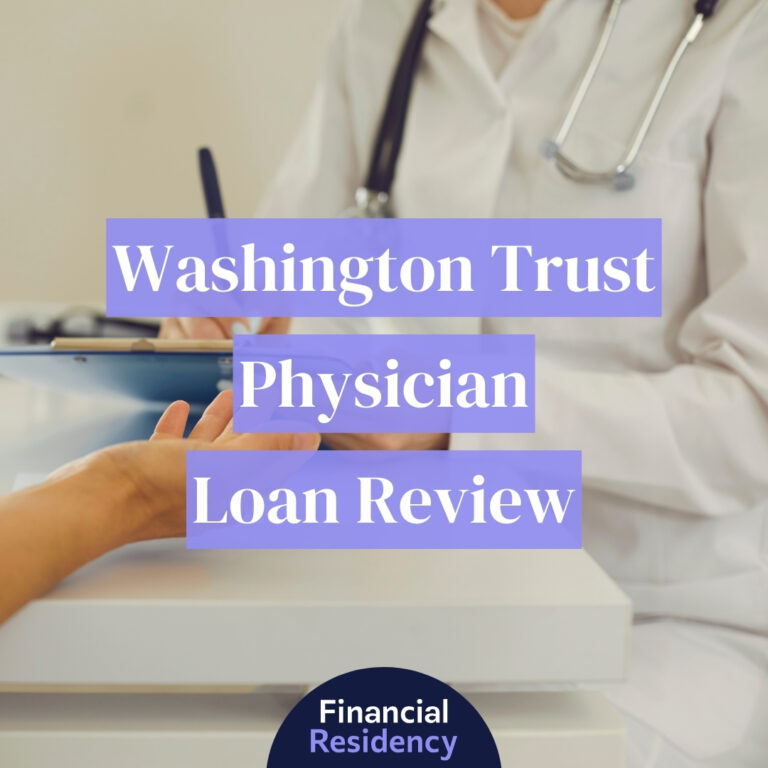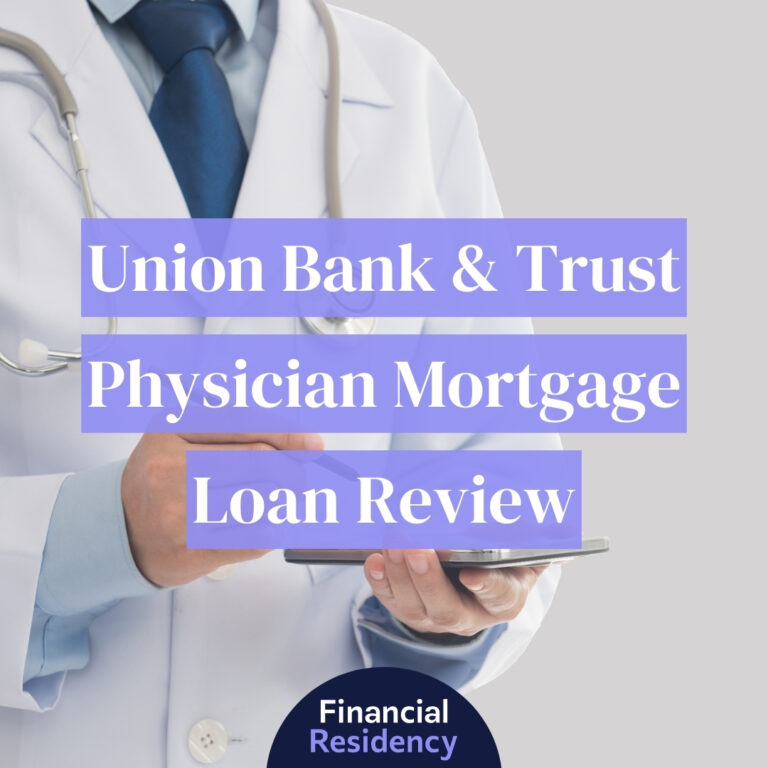In recent years, banks have been targeting physicians for a type of loan not available to the public called physician mortgage loans. Physicians have unique challenges with borrowing because they have high debt-to-income ratios.
We designed this guide to provide insights from years of experience working with attendings and residents to make your decisions much easier.
So, spend time with this guide to better understand if a physician mortgage loan is right for you when it comes time to purchase your home. Consider this a journey through the entire process of understanding and applying for a physician loan.
What are Physician Mortgage Loans?
A physician mortgage loan is a special mortgage product available to doctors.
They don’t have quite as many restrictions compared to what lenders require from borrowers of conventional loans.
If you have a decent credit score (around 700 or above), then you’ll find a physician home loan can make it faster and easier for residents and attendings to buy a home with little to no money down and avoid private mortgage insurance.
One of the many advantages of physician loans is you can present an offer letter as proof of future income if you haven’t started your position as a full-time attending physician, or you can present a copy of your transcript if you are still in training.
Lenders base these loans on future earnings, making them extremely attractive to physicians finishing their residency or just graduating from medical school.
How Do Physician Mortgage Loans Work?
Physician mortgage loans work a lot like traditional loans but with fewer restrictions. They allow doctors to secure financing for much higher loan amounts and with much lower down payments than conventional financing allows.
You must still prove you can afford the loan payments, are employed, and meet the specific requirements, but they generally have more favorable debt-to-income ratio and down payment requirements than other loans.
For example, some lenders may exclude certain types of student debt, or use a reduced payment. Others may accept an employment contract as income, even before you start your job.
Eligibility Requirements
Physician mortgage loans can offer quite the opportunity to a doctor, but you will still have to show you are qualified to take on the responsibility of the loan.
Who Qualifies for a Physician Loan?
While you may think that a physician loan is only available to, well, physicians, they are actually open to other high-income professionals:
- Accountants
- Advanced Practice Clinicians
- Attorneys
- Certified Registered Nurse Anesthetists (CRNA)
- Dentists
- Podiatrists
- Veterinarians
Factors Lenders Consider
What factors are the lenders looking at the most when you apply for these types of mortgages?
1. Down Payment Requirements
You can generally finance 80-100% of the loan as a physician. This is a tremendous benefit because saving the traditional 20% of a home purchase price can take years. You may be able to purchase a $1 million house with no money down. This is because statistics show fewer doctors default on loans than the general public.
2. Credit Score
Credit scores are an imperative part of qualifying for a physician loan. Most lenders require a credit score of at least 700 to prove you can afford the loan and are not a high risk. In general, the better credit you have, the lower interest rates lenders can offer, and the easier it is to qualify.
3. Debt-to-Income Ratio (DTI)
Your debt-to-income ratio is a major factor in whether you get approved for a physician loan, too. Your DTI measures your total debts compared to your gross income. Lenders consider student debt, credit cards, auto, and personal loans when determining your DTI. The fewer debts you have, the easier it is to qualify for a larger mortgage payment because you’ll have a lower debt-to-income ratio.
4. Self-Employment Requirements
If you are self-employed, you must submit two years’ worth of tax returns to show consistent income. To qualify, Self-employed doctors must also have great credit and a low debt-to-income ratio. This is because self-employed professionals pose a higher risk of default than someone who works for someone else.
Discover The Best Lenders Answer just a few questions about your career, where you're buying, and how much you want to borrow. Our service will then show you the exact programs you're eligible for from vetted physician loan specialists who will guide you through every step of the process – obligation-free!
Pros and Cons of Physician Mortgage Loans
Physician mortgage loans, like any mortgage financing, have pros and cons. Here’s what to consider when deciding if they are right for you.
Pros
- Low or no down payment requirements: Most lenders have a 0% down payment option, or at least keep the down payment to 5% – 10% of the sales price. This can lower the barrier to entry for new doctors who haven’t had time to save much yet.
- No PMI: Despite the lack of down payment required, most lenders don’t charge PMI (Private Mortgage Insurance) on physician mortgage loans. This can save you thousands of dollars over the life of the loan.
- More flexible DTI calculations: Lenders know doctors graduate with a large number of student loans. Many lenders only include the payments required on the income-based repayment plan and may exclude deferred payments when calculating your debt-to-income ratio.
- Higher loan limits: Traditional conventional loan limits are $766,500 in 2024, but doctors often want to purchase homes worth much more. Rather than subjecting you to jumbo loans with tougher requirements, physician mortgage loans often have limits of $1 to $3 million.
Cons
- Variable and higher interest rates: Many physician mortgage lenders charge variable interest rates on physician loans that are higher than traditional loans. This makes your interest rate and payment higher, unpredictable, and harder to budget.
- Limits on property type: Many lenders limit the property type you can purchase with a physician loan, usually limiting you to a primary residence. Some also limit the purchase of condos, only allowing single-family homes or townhomes.
- May lead to overspending: Just because you are approved for a higher loan amount doesn’t mean you can or should spend it. Getting in over your head in mortgage debt can lead to more financial stress than necessary.
- Starting with zero equity: Not putting any money down puts you at a disadvantage. Whether you want to borrow from your home equity in the future or sell the house soon, you may not have much equity to earn from it or may end up owing more than it’s worth.
My Experience With a Physician Mortgage
You might be curious as to why I’m so passionate about making sure you have a realistic point of view for physician mortgages. I personally used a physician mortgage when my wife and I moved our family from Las Vegas to San Diego in 2018.
There were a few major factors in our decision to go the physician mortgage route.
Smaller Down Payment
The largest reason by far was the ability to put less than 20% down on the new home loan. Fortunately for us, we actually had the 20% down. Unfortunately, it was all tied up in the equity of our home in Las Vegas. We decided we wanted to move without selling our current home since we had two toddlers and life was about as crazy as possible.
Once we made our big move and sold the house in Vegas, we were able to make a large one-time principal paydown. The physician mortgage option gave us the flexibility to help us during this transition.
Locked in Rate
We also used the services of Doug Crouse. You’ve probably seen his name here on the site or through our podcasts. He’s a good friend to the show but also really knows how to navigate through the physician mortgage process.
He helped us lock into a 5% fixed rate on a 30-year loan (we’ve since modified it since the rates are improving). He communicated with us through every step and really made it go as smoothly as possible for us.
Keep Paperwork in Order
My biggest piece of advice that I would give (or what I would do differently next time) is to have your paperwork extremely organized. The most complicated part is getting all the financial info together – and I’m a Financial Advisor!
Get everything in one place so you can access it easily. It’s not just information on your new mortgage, either. Make sure you have all the information ready to go for all of your assets and liabilities.
If you can get your finances organized and work with someone like Doug, the physician mortgage process will be much easier.
Find a Physician Mortgage In Your State
If you simply just want to find the best physician home loan, click on your state below to find the best lender and rate near you.
Alternatives to Physician Mortgage Loans
As tempting as it may be to focus only on the positive features of physician mortgage loans, you must understand your options before committing.
Just because you’re a physician, doesn’t necessarily mean the doctor mortgage loan is your best or only option. Let’s consider all the loans which are available to you.
1. Conventional Loans
A conventional loan is the most common mortgage option. Most lenders require a credit score of 620 and a maximum DTI of 43% for these loans.
You’ll need a down payment of at least 3% – 5%, and if putting down less than 20%, you will pay Private Morgage Insurance on the loan.
Conventional loans aren’t backed by any federal entities and are available as fixed or adjustable-rate loans. Fixed-rate loans have rates that don’t change for the entire term, and adjustable-rate loans adjust annually based on the chosen index they follow.
2. FHA Loans
The Federal Housing Authority backs FHA loans and they have more relaxed guidelines. Borrowers need at least 3.5% down and will pay mortgage insurance for the life of the loan. FHA loans don’t require great credit, allowing borrowers with credit scores as long as 580 to get financing. Some lenders allow credit scores as low as 500 but with a 10% or higher down payment.
Borrowers pay two types of mortgage insurance on FHA loans: an upfront insurance equal to 1.75% of the loan amount and an annual rate of 0.55% of the outstanding balance.
3. VA Loans
Hands down, the best mortgage option – whether you’re a physician or not – is the VA loan.
This loan is only available to former or current members of the military. The VA loan does not require a down payment like the physician mortgage loan. Although the government is not the lender for a VA loan, a certain percentage of the loan is backed by the government. This makes it an attractive product for both the borrower and the lender.
With VA loans, you will not be charged for PMI either. The interest rates on VA loans are very competitive and similar to conventional loans. There are no extra premiums for VA loans.
| Credit Score Requirement | Monthly or Yearly PMI Required | Down Payment Requirement | Fixed Interest Rate Option | Variable Interest Rate Option | |
|---|---|---|---|---|---|
| Physician Mortgage Loan | 700+ | No | $0 | Not Likely | Yes, and generally higher compared to other loans |
| Conventional Fixed-Rate Loan | 620+ | Yes, if you put less than 20% down | Minimum 3%-5% | Yes | No |
| Conventional Variable Rate Loan | 620+ | Yes, if you put less than 20% down | Minimum 3%-5% | No | Yes. Can choose between multiple types of loans such as 5/1 ARMs |
| FHA | 580+ | Yes, if you put less than 20% down | Minimum 3.5% | Yes | Yes |
| VA | 620+ | No | $0 | Yes | Yes |
How to Find a Physician Mortgage Lender
When looking for a physician mortgage lender, comparing your options is important. Every lender has different requirements and can handle different risks. The best way to find a physician mortgage lender is to get pre-approved by three or more lenders and compare your offers.
Look at the big picture, not just the interest rate or loan amount. Instead, consider the monthly payment, total interest costs, and the total of any fees you must pay to secure the loan. The right lender may not be the one offering the largest loan amount or best interest rate; look at the big picture to see which is best.
Who Should Get a Physician Mortgage Loan?
It’s important to compare all your options when choosing a mortgage, including the physician loan. While it can seem tempting to secure a mortgage for $1 million or more with no money down, it’s not always the right choice.
If you have some money to put down, have money saved for reserves, and are comfortable with the monthly payment, a physician loan can be a good idea. Consider comparing your options to any other loans you may be eligible for, including VA loans, to ensure you’re choosing the best loan.
How Much Should You Borrow With a Physician Mortgage Loan?
Use caution when borrowing a physician loan because there is potential to borrow very large loan amounts. However, borrowing $1 million or more can be devastating to your monthly finances if you cannot afford it.
Look at the monthly payment, the total interest you’ll pay, and any other debts you have or think you’ll incur in the near future to determine how much you should borrow. Don’t automatically accept the highest loan amount you qualify for; only choose the amount you’re comfortable accepting.
Frequently Asked Questions
Is a Fixed-Rate Mortgage or an Adjustable-Rate Mortgage Better?
An adjustable-rate mortgage could be attractive if it’s lower than any fixed-rate options you are offered. It would also be something to consider if you know you will be in your property for a shorter period of time versus your forever home.
Is a Physician Loan a Conventional Loan?
Physician loans are offered by independent lenders, and are not a government program. Conventional loans have stricter guidelines because lenders sell them on the secondary market to Fannie Mae or Freddie Mac, whereas physician loans often stay on the lender’s books.
Is a Physician Mortgage Loan the same as a Doctor Mortgage Loan?
A physician mortgage loan and a doctor mortgage loan refer to the same lending product. However, did you know a physician mortgage loan is not just for doctors, as the name might lead you to think? Dentists and orthodontists can use many of these mortgage products, too. Some lenders will use this for veterinarians.
Can Locums Doctors Get a Mortgage?
If you’ve adopted the locum lifestyle, this is a very important topic. There’s good news and bad news. The good news is, you can still get a mortgage. The bad news is, you are considered self-employed so you will go through a more rigorous process. If you’ve been working as a locums physician for at least two years, then don’t let it stop you from trying to obtain a physician mortgage.
A Major Decision Deserves Major Thought
Buying a home is a major decision, as is choosing the right mortgage. Whether you should choose a physician loan depends on your financial circumstances and what you can afford.
Look at the big picture, determine how long you’ll be in the home, what you can afford, and what other debts you have or will incur that will affect your ability to afford a mortgage.
A physician loan can be a large undertaking, especially if you borrow $1 million or more. Ensure it’s something you’re comfortable with and can easily afford now, before your income increases so you can easily afford it even as your career advances.




